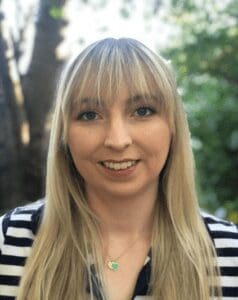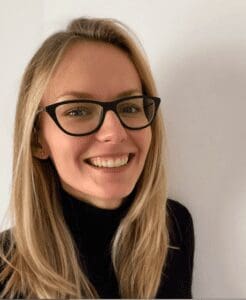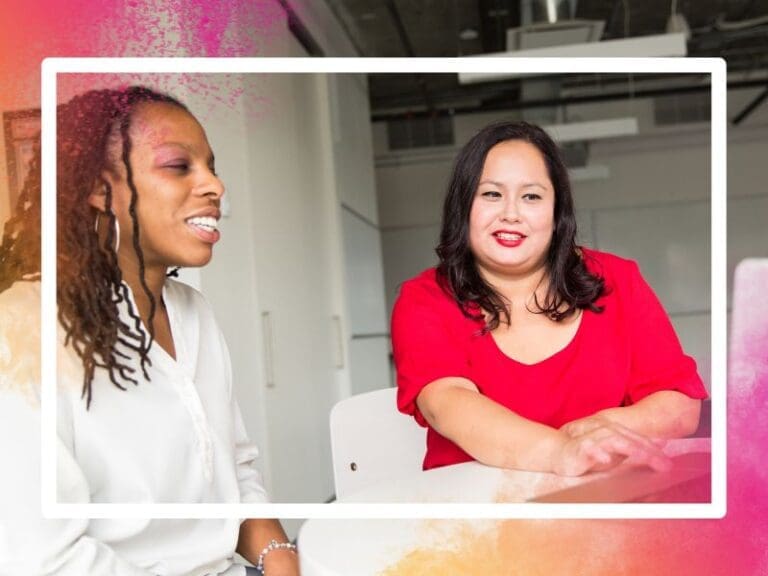Flipdish is on a mission to build technology that allows any hospitality business owner to compete with the largest food businesses in the world.
We caught up with some of the women engineers from Flipdish to tell us all about life at the online food ordering system.
Meet Amy Maciejewski, UX Researcher at Flipdish
 Originally from Chicago, I studied User Experience (UX) Design with a concentration in Development. During university I had several UX Internships, which transitioned into a full-time UX Developer role at the Federal Reserve Bank of Chicago. After a few months of being full-time, I decided to move to Ireland and spent a year networking, attending hackathons and joining professional organisations relating to my field. I eventually landed a UX Design role with Pramerica/Prudential Financial, where I spent two years before landing my current role at Flipdish!
Originally from Chicago, I studied User Experience (UX) Design with a concentration in Development. During university I had several UX Internships, which transitioned into a full-time UX Developer role at the Federal Reserve Bank of Chicago. After a few months of being full-time, I decided to move to Ireland and spent a year networking, attending hackathons and joining professional organisations relating to my field. I eventually landed a UX Design role with Pramerica/Prudential Financial, where I spent two years before landing my current role at Flipdish!
What does an average work day look like for you?
Work days vary a lot depending on what types of research projects are ongoing. If I’m conducting an in-person study, I will head to the office and set up all the equipment we need to test the product and record the session. Those days are usually filled with running test sessions and tracking insights.
When the sessions are complete, I’ll spend the majority of my day on analysis and putting common trends together. These are then turned into actionable recommendations for improving the design and shared with the designer and product manager. In between projects, I will plan research efforts based on items in the product roadmap; understanding the problem we’re trying to solve, the research method that will help us solve that problem and the effort/timeline needed to complete the project.
Are there any specific skills or traits that you notice companies look for when you’re searching for roles in your field?
Showing your process for solving problems and being able to clearly articulate that process. In research, we need to understand what we’re trying to achieve and how we can go about doing that. Being able to articulate the results of your research is especially important to ensure the recommendations you’re making are clearly understood. If you can’t communicate effectively, it can result in the wrong thing being designed or built, which will be a waste of your co-worker’s time and effort.
How do you think diversity can impact product design and development?
From a Product design point of view, I think diversity is absolutely essential. A successful product is one that accurately fits the needs of ALL of its users. Having a diverse team means having a diverse set of viewpoints that are considered from the beginning of the project. If the team building the product all share the same demographic, there’s a chance they may not consider the experiences of those with differing environmental contexts or accessibility standards.
What makes a role in Product great for someone who doesn’t have pure coding skills?
A great question for a UX Researcher! Having coding knowledge has helped me understand the effort behind projects and communicate with my co-workers effectively, but it’s definitely not a make or break. There’s a lot more to Product than just engineering, and it takes a well-rounded team to build a great product. This means having people with differing skills – whether that’s frontend development, backend development, interface design, interaction design or research.
That being said, if you know one of those isn’t your strongest skill, it’s essential to take the time to communicate with the rest of your team effectively and to understand each point of view. A UX Designer isn’t successful if they design something that can’t be developed and a Developer isn’t successful if they build something that has poor usability.
What questions do you think tech women should be asking at interviews regarding diversity and inclusion?
What are some ongoing initiatives your company has to promote diversity and inclusion? How have your current employees been affected by these initiatives? / How have you been able to measure the success of these initiatives? Are diversity and inclusion considered in every department? What does diversity look like at each level of your company?
Entering the world of work can be daunting. Do you have any words of advice for anyone feeling overwhelmed?
This industry can be overwhelming regardless of the number of years of experience you have. It’s important to recognise when you feel like that and to find balance in your day by going for a walk, taking a coffee break or just chatting to a friend. Sometimes a walk to the corner shop for a coffee is just what you need to go back to work a bit refreshed. Also, try to find a space where you can voice these feelings. It’s likely that others are feeling similar and having at least one person you can turn to at a stressful time can make a significant change to your day.
What advice would you give other women wanting to reach their career goals in technology?
My advice is to not be afraid of promoting your professional talent and to be confident in your abilities. Imposter syndrome is very real and can be hard to overcome, especially when you may be the only woman on your team. However, know that no one can take your knowledge away from you, regardless of what their assumptions of that knowledge may be.
Meet Stephanie Murphy, Software Engineer III, Frontend (Portal Operations Team) at Flipdish

I’m a software engineer living in Cork, Ireland. I have always been interested in technology and enjoy solving puzzles and letting my creativity flow. Because of this, I always knew a career in software engineering would be a perfect fit for me. I graduated with First Class Honours in BSc Computer Science from University College Cork in 2017 and have been working in software development ever since. I have worked primarily in frontend development with experience building applications for web, mobile, TV and Augmented Reality. I joined Flipdish in July 2021, where I have been working with an amazing team building exciting new features for the Flipdish Portal.
How did you land your current role?
In 2021, I felt it was time for a new adventure, so I began looking for a new role where I could be challenged and expand on my skills as a frontend engineer. When I heard about Flipdish’s mission to help food businesses grow and succeed, it really resonated with me. One of the main reasons why I pursued a career in software engineering was that I wanted to build applications and tools that would improve people’s day-to-day lives. I saw how the COVID pandemic was greatly impacting restaurants, especially ones without the capability of creating an online presence. I admired Flipdish’s mission and objectives and wanted to join them on this journey.
I wasn’t sure what position to apply for, but before I had a chance to decide, a member of Flipdish’s recruitment team reached out to me directly on LinkedIn and asked if I was looking for a new role. It sounded like a really exciting opportunity, so we set a time for an initial conversation where we discussed my background and where I could be a potential fit. Interviews quickly followed with the team’s engineers and managers combined with a fun coding challenge. I found the whole selection process very smooth and I really enjoyed the conversations with the team members. I was thrilled and excited when I received an offer to join the Flipdish team as a frontend software engineer – which of course, I accepted!
What does an average work day look like for you?
What I work on during the day can vary from bug fixes to implementing new functionality, to improving existing code. Once I align with my fellow team members, I have the freedom to work on what’s important, and I’m trusted to deliver high-quality features without being told how to build them. It’s one of the many things I love about working at Flipdish.
Another thing I love is that Flipdish is a remote-first company, meaning no commute to an office! I used to worry about catching trains or missing buses, but that is now a thing of the past. I can now use utilise that time to get more out of the working day. Some may think that working remotely is isolating and that remote workers miss out on collaboration, but I have found working remotely at Flipdish to be the complete opposite. Every day I am in direct contact with my colleagues whether it’s to discuss designs with the UX team, looking for guidance on a technical issue I’m facing or even just to chat. There is so much communication during the day – I never feel like I’m on my own. It’s great to know that there is someone just a message or video call away.
There are also opportunities in my working day to focus on my own professional development through learning. At Flipdish, the tech team is strongly encouraged to dedicate some time during the week to learn something new or expand on existing skills, which is amazing! There are also frontend guild sessions where frontend engineers across different teams can share knowledge on what we are working on, troubleshoot problems we are facing or present some new ideas.
Are there any specific skills or traits that you notice companies look for when you’re searching for roles in your field?
I strongly believe that companies seek software engineers that are passionate about what they do. Someone who thoroughly enjoys coding, solving problems and likes to learn about the latest technologies is going to stand out in an interview. In frontend development, there is always a new library or framework just around the corner. Someone who is not afraid of learning something new and eager to try new technologies to improve a product is an ideal candidate for this space.
In engineering, we tend to focus on the technical skills required for a role, however, it’s important not to forget the soft skills too. Strong communication skills are very important in frontend development. The frontend is a very visible part of an application and therefore, it requires clear communication and collaboration across different departments such as UX and product management to ensure a product that meets all requirements is being delivered.
Which qualifications have you found to be the most beneficial for securing jobs in engineering?
A bachelor’s or master’s degree in Computer Science/Engineering provides a great understanding of the fundamentals of software development, such as problem-solving, best coding practices and more. The traditional path to a career in software engineering involves going to college, getting your degree and then starting in a graduate role or an internship and progressing from there. However, I don’t believe this is the only route to landing your dream tech job. There are many high-quality online learning resources for anyone to start coding, regardless of what they studied at university or how many years it has been since they graduated.
Software engineering is becoming a more accessible industry to start a long and rewarding career in. Because of this, I’ve seen an important shift in what companies consider when accessing a potential candidate. Some companies no longer define a college degree as a minimum requirement for a role. What speaks louder is competency demonstrated through deliverables as part of online courses, open source repository contributions or personal coding projects. If you can demonstrate your abilities, especially using tools and frameworks that match a company’s own tech stack, that will certainly stand out in the recruitment process.
How do you think diversity can impact product design and development?
Diversity is a key ingredient for building a product that is intuitive and user-friendly for as much of the population as possible. A team that represents different perspectives and mindsets will find more opportunities to improve a product feature based on their own personal experiences and may consider different use case scenarios that their teammates didn’t think of. In fact, many studies have proven that diversity and inclusion greatly increase productivity, employee engagement and innovation.
Diversity is a very important part of a company’s work culture. Employees want the freedom to be themselves at work without the pressure of having to act a certain way in order to progress in their careers. One of the ways they can do that is when they can be comfortable being who they truly are around their peers. When employees can be themselves, it gives them the confidence to challenge designs or suggest new ideas, which will all impact development in a very positive way.
Has anyone ever tried to stop you from learning and developing in your professional life, or have you found the tech sector supportive?
I have been very fortunate in my career as I have always been surrounded by people who have supported me and believed in me throughout the years. Even during times when I doubted myself or my abilities, I have found there has been a manager or a colleague cheering me on, putting all my doubts at rest and providing me with the support I needed to reach my aspirations. I’m aware that I am very lucky to have these people in my life and that not everyone is in a position where they feel supported in their careers.
I would like to say to anyone who feels they are not getting the support, guidance or resources they need to grow professionally, please raise this within your company. If they refuse to provide you with what you need to succeed, then look for a company that will. It may be scary to take that step but never feel like you have to sacrifice your own development for someone that isn’t going to help you reach your goals, especially when there are some amazing tech companies out there that will invest in you.
Have you ever faced insecurities and anxieties during your career, and how did you overcome them?
Yes! Early in my career, I used to be terrified of making mistakes. Whether it was the fear of breaking a bit of functionality or writing code that could be done in a better way, I used to be anxious about messing up. I quickly came to realise that nobody is perfect. Whether you are an intern at the early stages of your career or a senior engineer with 10 years of experience, you will make mistakes every now and again because you are human. Instead of fearing making mistakes, I have now embraced them as an opportunity to learn as I have realised that trying something new and making missteps along the way is more rewarding than not trying at all.
There are occasional moments where my Imposter Syndrome creeps in and tries to fill me with self-doubt. Even when I receive praise at work, sometimes I feel like I’m not skilled enough to deserve it. While I haven’t fully erased my Imposter Syndrome, I have been working on ways to manage it. For example, whenever I catch myself trying to discredit my achievements or moments I’m proud of, I push those negative thoughts aside and focus on the hard work I had to put in and the challenges I had to overcome to account for those achievements. We can be our worst critics, and it’s very easy to go down a spiral of negativity and downplay our abilities and successes, but It’s important for our mental health to keep our self-criticism in check and acknowledge the great things we are capable of.
What advice would you give other women wanting to reach their career goals in technology?
Never stop learning! The tech industry evolves day by day, so there is always an opportunity to expand your technical knowledge. Reading tech blogs, watching webinars or attending conferences are some great ways to keep up to date on the latest advancements in software development. The most important step in achieving career success is learning and development. It’s essential to not only self-access your performance but to seek feedback from colleagues on areas where you can grow. Take this feedback and set a plan of action with your manager on how you can gain the skills required to fill in the gaps required to meet your goals.
While self-awareness of where you can improve is important, it is also imperative that you know what your strengths are and take pride in them. Sometimes the biggest obstacle in our career path is our lack of confidence that we are capable of reaching our goals. Take time to reflect on the progress made on your career journey to date and know that through the same effort and dedication, you will reach your goals!
Meet Kate Kaczmarek, Senior Product Manager for the Portal Operations team (B2B product) at Flipdish
 My journey started early in my childhood when I started playing games and being fascinated with computers at age five. With this mindset, I pursued a technical degree in Computer Science, with a focus on Project Management. While still at university, I started my career in gaming as a Game Producer. I successfully launched 16 game titles across PC, mobile and web platforms.
My journey started early in my childhood when I started playing games and being fascinated with computers at age five. With this mindset, I pursued a technical degree in Computer Science, with a focus on Project Management. While still at university, I started my career in gaming as a Game Producer. I successfully launched 16 game titles across PC, mobile and web platforms.
After five happy years, I decided to change industries and I went into Advertising Technology, where we leveraged consumer location data to draw insights and help brands reach the most relevant audiences based on location behaviour. This involved working with big datasets (7TB data per day), solving scalability and low latency problems, building CMS and reporting/insights platforms, and many more. After another five and a half years, I have yet again decided to change industries, and that’s how I landed in Flipdish.
How did you land your current role? Was it planned?
I was looking for a new opportunity as a Senior Product Manager. I was searching for a place where I could grow and feel challenged at a company that operates in an industry that is new to me, so that I could learn. I wanted to work at a company that had a vision and a mission, which aligned with my ethics. I didn’t necessarily plan Flipdish, but I’m glad I found it!
What are you most proud of in your career so far?
I’m proudest of my work in the gaming industry. As a child, I dreamed of building a game myself. I had an opportunity to build multiple games in my career, but the two I’m most proud of are the Easter Egg game for Roblox and Mobile game with Keymon (Nickelodeon character), which won two mobile games awards.
What does an average work day look like for you?
No day is the same in my role as a Product Manager. My days are full of ideating, planning, brainstorming, asking questions, building business cases, listening to customers, solving problems, removing blockers and having fun with it all.
Are there any specific skills or traits that you notice companies look for when you’re searching for roles in your field?
Absolutely! I think the best Product Managers I’ve met have the right attitude – they are obsessed with problems, use challenges as an opportunity, are creative and open-minded, have strong emotional intelligence, are attentive to details and can spread positive energy, so that people in their team get excited to work with them.
Which qualifications have you found to be the most beneficial for securing jobs in engineering?
My Computer Science degree definitely helped me to increase my credibility with hiring managers and teams I worked on.
How do you think diversity can impact product design and development?
Greatly! Having a diverse team significantly impacts the output in a positive way. Diverse teams have a wider spectrum of opinions on what “good” looks like. It helps to build the best user experiences, while considering different points of view. It is especially important if they are building products for wider audiences as we do at Flipdish.
What makes a role in Product great for someone who doesn’t have pure coding skills?
Those who work in Product and don’t have coding skills are usually not limited to technical conditioning. What I mean by that, is that they cannot see the limits. This can really help and drive innovation.
What do you think are the most important things our community should know about what it’s like to work at Flipdish?
The best things I experienced in Flipdish to-date, is the autonomy and the friendly people. I’ve been working professionally for more than 11 years, and by far, this is where I feel like I have the most impact and support in my role.
How does Flipdish’s brand mission guide how you build products?
It helps me to focus on building the best experiences for our clients and customers. We truly optimise for efficiency and convenience so that our products are easy and quick to use – you really don’t want to irritate hungry people.
Has anyone ever tried to stop you from learning and developing in your professional life, or have you found the tech sector supportive?
Unfortunately, yes. Especially when I started my career, I was often perceived as incapable because I was young and a woman. Having experienced bias and unsupportive team members, I think it’s important to talk about it openly, provide candid feedback and take action when necessary. However, I also want to say that there are also lots of people who are supportive and empowering, and it’s important to find a place where you get that.
Have you ever faced insecurities and anxieties during your career, and how did you overcome them?
I used to really worry about every possible thing. Over time, I’ve learned that it is more important to enjoy your work and to be realistic. Bringing your true self – whatever it might be – is the biggest gift that you can bring to a company and business. If you are a witty person, use it! You will make everyone laugh, and they will absolutely love working with you. If you are pixel-perfect, use it! You’ll spot details that other people don’t see. Your skills will play a huge part in the quality of the products you build.
Entering the world of work can be daunting. Do you have any words of advice for anyone feeling overwhelmed?
Accept the fact that you won’t know everything. I’ve been in the business for over a decade, but I know I will never know everything. Don’t pretend to be someone you are not. It might be a controversial thing to say, but I think the “fake it till you make it” approach is really damaging. Be open and honest, and enjoy every minute of experiencing this new stage of life.
What advice would you give other women wanting to reach their career goals in technology?
Don’t be afraid to be yourself, and don’t feel like you ever need to compromise on anything because you are a woman. Embrace your womanhood!
Discover more about a career with Flipdish








